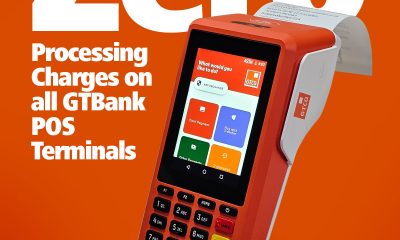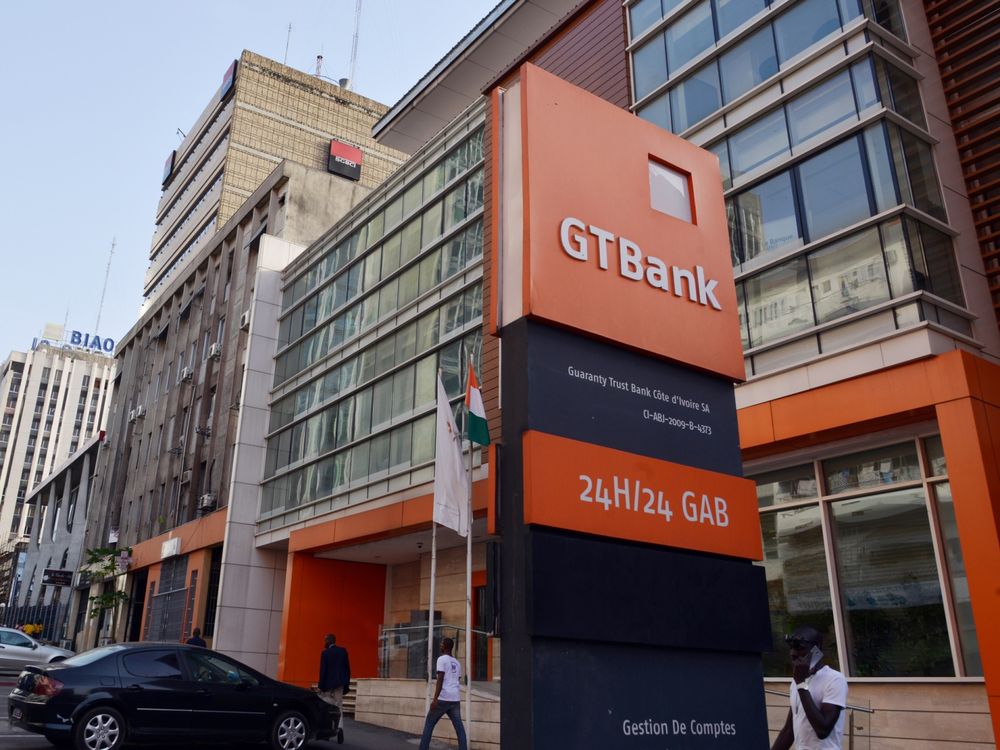Banking
High Credit Risk, FX Income Dominate GTBank Performance


By Modupe Gbadeyanka
One of the foremost financial firms in Nigeria, Guaranty Trust Bank Plc (GTBank) delivered an impressive performance in FY 2016, inspite of the low pace of credit expansion that characterized the year amid the heightened credit risk environment.
The bank, since its inception, has been dominating the sector in Nigeria, growing its customers’ base and delivery impressive performances.
After reviewing the FY 2016 earnings release and the expected performance of the bank, Wstc Financial Services Limited assigned a BUY rating on the stock, with a fair value of N29.74 implying that the current market price is trading at a 19.4 percent discount to fair value.
GTBank currently trades at a forward P/E multiple of 6.34x and P/B of 1.36x
Gross earnings grew by 37.4 percent to N415 billion (FY 2015: N301 billion), primarily on account of a significant FX revaluation gain of N87 billion (FY 2015: N5 billion) recorded in the year.
This was characteristic of the industry and akin to other players with foreign currency net asset exposure, in the light of the currency depreciation recorded in Q2 & Q3 2016.
Interest income grew by 14.5 percent to N262 billion (FY 2015: N229 billion), reflecting the impact of the elevated interest rate environment, while Interest expense declined by 3.2 percent to N67 billion (FY 2015: N69 billion).
GTBank recorded a lower interest expense which primarily resulted from the early redemption of $500 million out of the outstanding November 2013 $902 million 5-year Eurobond.
A sinking fund has also been set up towards the redemption of the remaining $402 million with no plans of refinancing, according to guidance from management. A combination of the remarkable growth in interest income and contraction in interest expense led to a 22.2 percent growth in Net interest income to N195 billion (FY 2015: N160 billion).
The deterioration in the macro environment stressed asset quality and caused a sharp rise in non-performing loan (NPL) to N61 billion (FY 2015: N45 billion) with an NPL ratio of 3.66 percent (FY 2015: 3.21 percent).
Consequently, the bank recorded a significant impairment charge of N65 billion, representing a 426.0 percent surge from FY 2015 levels of N12 billion. The bulk of the impairment charge reported was largely driven by increase in provision on FX denominated facilities due to the currency depreciation.
In line with the elevated inflationary environment, operating expense (Opex) increased by 17.9 percent to N114 billion (FY 2015: N96 billion). The key Opex drivers were fuel cost & translation differences from foreign subsidiaries.
In tandem with the impressive performance from top line, profit before tax increased by 36.8 percent to N165 billion (FY 2015: N120 billion), while profit after tax increased by 33.0 percent to N132 billion (FY 2015: N99 billion).
The Bank proposed a total dividend of N2.00, representing a payout ratio of 43 percent (FY 2015: 51 percent).
Wstc Financial Services Limited says it expects high yield on government securities to continue to support growth in interest income in FY 2017, as it expects a marginal expansion in loan book size.
Also, barring significant volatility in the FX market, the firm said it does not expect the level of FX gains recorded in FY 2016 to recur in FY 2017.
“Thus, we expect a 12.6 percent decline in gross earnings in FY 2017.
“We expect cost of funds to increase in reflection of the high interest rate environment. Also, we believe the newly introduced FGN savings bond may somewhat crowd-out the bank’s retail deposits and impact negatively on interest expense,” Wstc Financial Services Limited said.
In view of the bank’s significant loan book exposure to the oil & gas sector and the weak outlook of oil price as well as management’s recent disclosure that the Etisalat Nigeria loan (N42 billion) is expected to be restructured sometime in Q2 2017, and Wstc Financial Services Limited still expects a high impairment charge on risk assets to be recorded in FY 2017.
“Thus, we estimate that the bank’s ROAE will decline to 22.5 percent by FY 2017 (from 29.1 percent in FY 2016) as the cost to income ratio increases to 45.1 percent from 40.8 percent which resulted from FX income in FY 2016.
“We expect a FY 2017 PBT of N142 billion (more conservative than management’s guidance of N168 billion),” it added.
In estimating the fair value of GTBank, Wstc Financial Services Limited adopted a blended valuation methodology using the residual income and dividend discount valuation approaches.
Its initial year cost of equity (COE) estimate of 21.3 percent was computed using a 10-yr risk-free rate of 15.89 percent, beta of 0.74 (relative to the NSE ASI) and an equity risk premium of 5.69 percent.
Wstc Financial Services Limited says it arrived at a Fair value estimate of N29.74 per share, pointing out that its fair value estimate implies justified forward P/E multiple of 7.57x and P/BV multiple of 1.62x, while the current market price is at an 19.4 percent discount to its fair value; “hence, we rate the company’s stock a BUY.”
Banking
All Set for Second HerFidelity Apprenticeship Programme

By Modupe Gbadeyanka
Registration for the second HerFidelity Apprenticeship Programme (HAP 2.0) organised by Fidelity Bank Plc has commenced.
The Divisional Head of Product Development at Fidelity Bank, Mr Osita Ede, informed newsmen that the initiative was designed to empower women with sustainable entrepreneurship skills.
The lender created the flagship women-empowerment initiative to equip women with practical, income‑generating skills and structured pathways to entrepreneurship.
“HerFidelity Apprenticeship Programme 2.0 reflects our commitment to continuous improvement. Having evaluated feedback from the first edition, we have returned with stronger partnerships and deeper mentorship programmes to ensure that women acquire not just skills, but sustainable economic opportunities,” he said.
“At the heart of the programme is guided, real‑world learning. Participants will undergo intensive apprenticeship training under reputable institutions and industry experts across select fields such as hair styling, shoe making, auto mechatronics, and interior decoration,” Mr Ede added.
He noted that HerFidelity Apprenticeship Programme 2.0 goes beyond skills acquisition by offering participants a wide range of business advisory services. These include business and financial literacy training, mentorship support throughout the apprenticeship journey, access to Fidelity Bank’s women‑focused and SME financial solutions, as well as guidance on business formalisation and growth strategies.
Further emphasising the bank’s vision, Mr Ede said, “By integrating structured mentorship with entrepreneurial development, Fidelity Bank is positioning women not just as trainees, but as future employers, innovators, and economic contributors within their communities. This aligns with our mandate to help individuals grow, businesses thrive, and economies prosper.”
Banking
The Alternative Bank Opens New Branch in Ondo

By Modupe Gbadeyanka
A new branch of The Alternative Bank (AltBank) has been opened in Ondo State as part of the expansion drive of the financial institution.
A statement from the company disclosed that the new branch would support export-oriented agribusinesses through Letters of Credit and commodity-backed trade finance, ensuring that local producers can scale beyond state borders.
For SMEs, the bank is introducing robust payment rails, asset financing for equipment and inventory, and supply chain-backed facilities that strengthen working capital without trapping businesses in interest-based debt cycles.
The Governor of Ondo State, Mr Lucky Aiyedatiwa, represented by his Chief of
Staff, Mr Olusegun Omojuwa, at the commissioning of the branch, underscored the importance of financial institutions in economic development.
“The pivotal role of financial institutions to economic growth and development of any economy cannot be overemphasised. It provides access to capital, supporting small and medium-scale enterprises and encouraging savings.
“Therefore, I have no doubt in my mind that the presence of The Alternative Bank in Ondo State will deepen financial services, create employment opportunities and stimulate economic activities across various sectors,” he said.
In her remarks, the Executive Director for Commercial and Institutional Banking (Lagos and South West) at The Alternative Bank, Mrs Korede Demola-Adeniyi, commended the state government’s leadership and outlined the lender’s long-term vision for Ondo State.
“As Ondo State steps into its next fifty years, and into the future anchored on the sustainable development championed during the recent anniversary celebrations, The Alternative Bank is here to be the financial engine for that vision. We didn’t come to Akure to hang banners. We came to fund work, farms, shops, and factories.”
With Ondo State’s economy anchored largely on agriculture, particularly cocoa production, poultry farming, and other cash crops, alongside a growing SME and trade ecosystem, AltBank is deploying sector-specific financing solutions tailored to these strengths.
For cocoa aggregators, processors and poultry operators, the bank will provide production financing, facility expansion support, machinery lease structures, and structured trade facilities under its joint venture and cost-plus financing models, with transaction cycles of up to 180 days for commodity trades and longer-term structured asset financing for equipment and infrastructure.
The organisation is a notable national non-interest bank with a physical network now surpassing 170 locations, deploying capital to solve real-world challenges through initiatives such as the Mata Zalla project, which saw to the training of hundreds of women as electric tricycle drivers and mechanics.
Banking
Recapitalisation: 20 Nigerian Banks Now Fully Compliant—Cardoso

By Adedapo Adesanya
The Governor of the Central Bank of Nigeria (CBN), Mr Yemi Cardoso, announced on Tuesday that the country’s banking sector is making strong progress in the recapitalisation drive, with 20 banks now fully compliant.
Mr Cardoso disclosed this during a press conference at the first Monetary Policy Committee (MPC) meeting of 2026, where he also highlighted positive developments in the nation’s foreign reserves.
On March 28, 2024, the apex bank announced an increase in the minimum capital requirements for commercial banks with international licences to N500 billion.
National and regional financial institutions’ capital bases were pegged at N200 billion and N50 billion, respectively.
Also, CBN raised the merchant bank minimum capital requirement to N50 billion for national licence holders.
The banking regulator said the new capital base for national and regional non-interest banks is N20 billion and N10 billion, respectively.
To meet the minimum capital requirements, CBN advised banks to consider the injection of “fresh equity capital through private placements, rights issue and/or offer for subscription”.
Following the development, several banks announced plans to raise funds through share and bond issuances.
In January, Zenith Bank said it had raised N350.46 billion through rights issue and public offer to meet the CBN minimum capital requirement.
Guaranty Trust Holding Company Plc (GTCO), on July 4, said it had successfully priced its fully marketed offering on the London Stock Exchange (LSE).
In September, the CBN governor said 14 banks fully met their recapitalisation requirements — up from eight banks in July.
With one month to the central bank’s March 31, 2026, recapitalisation deadline, 13 Nigerian lenders are yet to cross the finish line.
Additionally, the governor noted that 33 banks have raised funds as part of the ongoing recapitalisation exercise, signalling robust capital mobilisation across the sector.
He stated that gross foreign reserves have climbed to a 13-year high of $50.4 billion as of mid-February 2026.
-

 Feature/OPED6 years ago
Feature/OPED6 years agoDavos was Different this year
-
Travel/Tourism10 years ago
Lagos Seals Western Lodge Hotel In Ikorodu
-

 Showbiz3 years ago
Showbiz3 years agoEstranged Lover Releases Videos of Empress Njamah Bathing
-

 Banking8 years ago
Banking8 years agoSort Codes of GTBank Branches in Nigeria
-

 Economy3 years ago
Economy3 years agoSubsidy Removal: CNG at N130 Per Litre Cheaper Than Petrol—IPMAN
-

 Banking3 years ago
Banking3 years agoSort Codes of UBA Branches in Nigeria
-

 Banking3 years ago
Banking3 years agoFirst Bank Announces Planned Downtime
-

 Sports3 years ago
Sports3 years agoHighest Paid Nigerian Footballer – How Much Do Nigerian Footballers Earn




















